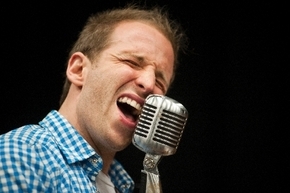Why are Las Vegas shows in a hurry to close?

Has anyone noticed how quickly shows close these days?
Just about every new arrival to casino venues this year has made a hasty exit, with producers pulling the plug faster than they used to.
The Ray Charles tribute “Georgia on My Mind” called it quits at The Venetian last week, two weeks before the end of what was already a limited six-week run.
“Viva Veracruz” also was billed as a limited run at Planet Hollywood, hoping a four-month window would be long enough to prove its viability. The dance revue managed to open in time for the Mexican Independence week traffic, but lasted only two weeks, despite funding from the Mexican state of its title.
In that same theater at Planet Hollywood, the topless “Sydney After Dark” closed before its official opening night last summer.
But those shows you haven’t heard of. The biggest shocker of all was the quick exit of a certified blockbuster, the Broadway hit “Mamma Mia!” that bailed only three months into an open-ended run at the Tropicana.
That makes “Vegas Nocturne” — a closing that resulted in lawsuits between its producers and The Cosmopolitan — the title given the longest time to prove itself: six months.
What’s going on here?
“If you open a show and you know out of the gate, ‘Oh we’re in trouble,’ why would you want to keep spending good money after bad? It doesn’t make any sense,” says Adam Steck, the experienced Las Vegas producer who partnered with newcomers to open “Sydney.”
Steck says he quickly realized “the show should be in a much smaller venue, and the content wasn’t as hot as I told them it should be. And I just didn’t think it was going to get any traction. I didn’t want to have (the major investor) waste his money, so I told them there’s no shame in closing. You redo it later and try to move it to a smaller venue.”
Makes sense. But why has such common-sense thinking not always been the case? Look to the relationship with the host property. The past decade completed the shift to casinos as landlords, or at best, partners with outside entities such as Cirque du Soleil. It’s the rare title, such as the Stratosphere’s “Pin Up,” that’s bankrolled in-house like the old days.
Now, casinos are more likely to invest in nightclubs, a less-risky and higher-percentage return on investment.
Clint Holmes was a star of “Georgia,” which brought him back to the Strip for the first time since his Harrah’s Las Vegas showcase of the 2000s. “They gave me time,” he says of the old days. “The hotel was invested in the show completely. … My first contract was a year.”
The new Ray Charles tribute also was “good enough that if we’d had time, we could have found an audience,” Holmes says. It was invited to The Venetian by hotel President Rob Goldstein — producer Larry Rosen said he would not otherwise have targeted it beyond performing arts centers — but the invitation apparently didn’t include long-term subsidies.
If there’s any good news to offset all this, it’s that there is an alternative. If Las Vegas is becoming more like a theater city in the lack of casino life support, it’s also becoming more like New York or Chicago in a positive way.
For years, I’ve complained Las Vegas has no workshops or previews; no pipeline to develop a new work in a low-cost setting. It’s all or nothing, and “previews” are usually a phrase thrown at critics to stall reviews, not something explained to paying customers.
But now, if you want to find a really new show, look beyond the Strip to places such as Art Square. It’s the downtown studio theater where Martin Kaye — the piano-pounding Jerry Lee Lewis in “Million Dollar Quartet — will unveil his own showcase, “Should’ve Been a Doctor,” on Nov. 1.
When he first found himself here with “Quartet,” Kaye immediately cast “an eye to doing something on my own at some point in the future.”
However, he “didn’t know anything about Vegas and shows and the politics and the business side of it.” Now, he understands there’s a smarter if slower path, with plenty of creative support.
“It’s the same with a restaurant, or any kind of business really,” he says. “You just have to build up the name, so that people know about you and come back to you. It’s a very scary thing, but I have to do it. I have to try. … And I have to keep trying it in different contexts, to see if there’s some way I can get to where I want to be.”
Contact reporter Mike Weatherford at mweatherford@reviewjournal.com or 702-383-0288.